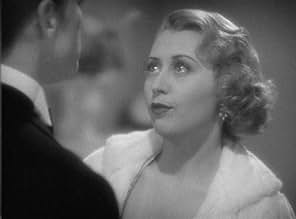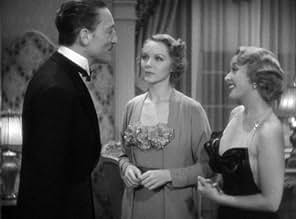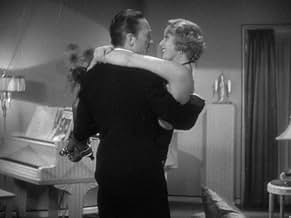Vicki Wallace teases her husband Tony until he hits her. After divorcing and marrying Vernon, her behavior leads to similar results. She returns to Tony's place, where drama unfolds with his... Read allVicki Wallace teases her husband Tony until he hits her. After divorcing and marrying Vernon, her behavior leads to similar results. She returns to Tony's place, where drama unfolds with his date Bonnie and Vernon's friends.Vicki Wallace teases her husband Tony until he hits her. After divorcing and marrying Vernon, her behavior leads to similar results. She returns to Tony's place, where drama unfolds with his date Bonnie and Vernon's friends.
Monica Bannister
- Model
- (uncredited)
Frederick Burton
- Judge
- (uncredited)
Virginia Dabney
- Duryla Model
- (uncredited)
Frank Darien
- Court Spectator
- (uncredited)
Lester Dorr
- Court Recorder
- (uncredited)
Sarah Edwards
- Mrs. Crosby's Mother
- (uncredited)
Bill Elliott
- Nightclub Patron
- (uncredited)
June Glory
- Model
- (uncredited)
Bert Moorhouse
- Court Clerk
- (uncredited)
Dennis O'Keefe
- Nightclub Patron
- (uncredited)
Featured reviews
Perhaps too many folks are getting their things in an uproar about this zippy, fast-paced little comedy about the battle of the sexes. Yes, there are slaps in the film, but Blondell's character seems intent on getting them-- which to modern eyes seems bizarre indeed, and offensive in too many ways. But there is no indication that wife-beating is really the focus of this film, but instead the games people play when they discover relationship kinks that are not mainstream.
In many ways, this is a deeply cynical film (witness the running commentary from the two constant house guests) about public and private lives, the last gasp of pre-code comedy before the censors came down hard on creative expression of and shuttered them into the kitchen with their aprons for the next thirty years or so, when Elizabeth Taylor and Richard Burton exposed a more modern version of the S/M games that can develop when love is stunted by circumstance. This is not a great film by any measure, but viewed in an unusual context can be great fun.
In many ways, this is a deeply cynical film (witness the running commentary from the two constant house guests) about public and private lives, the last gasp of pre-code comedy before the censors came down hard on creative expression of and shuttered them into the kitchen with their aprons for the next thirty years or so, when Elizabeth Taylor and Richard Burton exposed a more modern version of the S/M games that can develop when love is stunted by circumstance. This is not a great film by any measure, but viewed in an unusual context can be great fun.
With such a short running time, there's no time for character development or background - you're instantly thrown into a very private scene of a failing marriage. You're instantly thrown into their slightly surreal, privileged and fake world. You want to know why are they like this. This is explained in this first scene where Joan Blondell is provocatively putting on her stockings in front of her husband who is unable to insert his cufflinks - this and the diced carrots analogy tells you everything you need to know about this marriage.
Apart from Frank McHugh's comedy relief character, none of the other characters are that likeable - they're not black and white but a lot more multi dimensional than is typical from films of this era. Even Joan Blondell is horrible whilst at the same time being utterly desirable and makes her character completely believable as someone who can manipulate these weak men, well to be honest, all men.
In typical 1930s penny-pinching WB style, this was all put together in just three weeks with people working 14 hour days. Joan was having her own serious marriage problems at the time and was so over-worked that she collapsed from mental exhaustion shortly after this was finished. Despite this and the perceived light-hearted approach to violence towards women - which is a little uncomfortable to watch (but when viewed in the context of these damaged characters makes sense), Smarty is still fun to watch and Joan somehow manages to look amazing and be convincing.
Considering it's a rush-job, it's reasonably well directed although a bit stagey at times and well acted even by WE and EEH who are out of their usual comfort zones. Overall - an enjoyable fun picture that's also a lot deeper and more thought provoking than you'd expect.
Apart from Frank McHugh's comedy relief character, none of the other characters are that likeable - they're not black and white but a lot more multi dimensional than is typical from films of this era. Even Joan Blondell is horrible whilst at the same time being utterly desirable and makes her character completely believable as someone who can manipulate these weak men, well to be honest, all men.
In typical 1930s penny-pinching WB style, this was all put together in just three weeks with people working 14 hour days. Joan was having her own serious marriage problems at the time and was so over-worked that she collapsed from mental exhaustion shortly after this was finished. Despite this and the perceived light-hearted approach to violence towards women - which is a little uncomfortable to watch (but when viewed in the context of these damaged characters makes sense), Smarty is still fun to watch and Joan somehow manages to look amazing and be convincing.
Considering it's a rush-job, it's reasonably well directed although a bit stagey at times and well acted even by WE and EEH who are out of their usual comfort zones. Overall - an enjoyable fun picture that's also a lot deeper and more thought provoking than you'd expect.
... that being that a husband slapping his wife is actually a turn on for her. Tony Wallace (Warren William) slaps his wife Vicki (Joan Blondell) during a small gathering at their apartment for saying the phrase "diced carrots", which is some kind of marital in joke. Kind of like "Niagara falls" in the old Three Stooges routine. The phrase makes Tony go crazy. Attorney Vernon Thorpe (Edward Everett Horton), who has always loved Vicki, is present at the time and tells her that he can get her a divorce on the grounds of extreme cruelty.
He does, and fast forward and Vicki has married Vernon. But the grass is not greener. Vicki finds herself bored with Vernon's kind and giving ways and decides she wants her first husband back. Complications ensue.
It really pains me to give a movie with the best WB had to offer in comedy in front of the camera in 1934 only a mediocre grade. But the characters are cardboard and the very thin humor wore on me after a very short while. And Blondell is playing one of the most annoying nagging characters in the history of film, although she is playing it tongue in cheek. How I felt about this film was very similar to how I felt about the very first production code comedies because they often substituted shouting and motion for that great precode bite and energy.
He does, and fast forward and Vicki has married Vernon. But the grass is not greener. Vicki finds herself bored with Vernon's kind and giving ways and decides she wants her first husband back. Complications ensue.
It really pains me to give a movie with the best WB had to offer in comedy in front of the camera in 1934 only a mediocre grade. But the characters are cardboard and the very thin humor wore on me after a very short while. And Blondell is playing one of the most annoying nagging characters in the history of film, although she is playing it tongue in cheek. How I felt about this film was very similar to how I felt about the very first production code comedies because they often substituted shouting and motion for that great precode bite and energy.
An early and not very effective entry in that 1930's movie specialty-- the screwball comedy. Some necessary elements are present— ritzy wardrobes, sophisticated dialog, colorful characters. Then too, the plot's appropriate-- a farcical marriage-go-round where no one much cares who's married to whom.
At the same time, catch the sexy Vicky (Blondell) as she endlessly rolls and unrolls her hosiery, that is, when not fitting into backless evening wear or craving a little rough man-handling. In short, it's the kind of provocative material that soon brought down the heavy hand of Hollywood censorship. (Scope out the very last scene that I expect challenged even the loose conventions of the time.)
The women are well cast, including the eye-rolling Blondell, a dryly sensible Claire Dodd, and a sweetly seductive Joan Wheeler. The problem is with the two male leads. Now, I'm a big fan of Warren William who's unequalled in ruthless, authoritative parts, e.g. Employee's Entrance (1933), Skyscraper Souls (1932), which remain true period classics. The trouble is that the role here of the discombobulated husband Tony calls for the light comedy skills of a William Powell, for example; the aristocratic William does try hard, but lacks that particular flair. Also, the naturally comedic Horton is memorable in eccentric parts, but is unfortunately miscast here as a strait-laced, jealous husband.
At the same time, director Florey doesn't manage the kind of zany pacing that could have smoothed over some of the questionable parts. Too much of his deliberate tempo comes across like the stage play the material is adapted from. As a result, the movie has its moments—mainly the super coy Blondell and a provocative parade of 30's fashions—but is otherwise a titillating disappointment.
At the same time, catch the sexy Vicky (Blondell) as she endlessly rolls and unrolls her hosiery, that is, when not fitting into backless evening wear or craving a little rough man-handling. In short, it's the kind of provocative material that soon brought down the heavy hand of Hollywood censorship. (Scope out the very last scene that I expect challenged even the loose conventions of the time.)
The women are well cast, including the eye-rolling Blondell, a dryly sensible Claire Dodd, and a sweetly seductive Joan Wheeler. The problem is with the two male leads. Now, I'm a big fan of Warren William who's unequalled in ruthless, authoritative parts, e.g. Employee's Entrance (1933), Skyscraper Souls (1932), which remain true period classics. The trouble is that the role here of the discombobulated husband Tony calls for the light comedy skills of a William Powell, for example; the aristocratic William does try hard, but lacks that particular flair. Also, the naturally comedic Horton is memorable in eccentric parts, but is unfortunately miscast here as a strait-laced, jealous husband.
At the same time, director Florey doesn't manage the kind of zany pacing that could have smoothed over some of the questionable parts. Too much of his deliberate tempo comes across like the stage play the material is adapted from. As a result, the movie has its moments—mainly the super coy Blondell and a provocative parade of 30's fashions—but is otherwise a titillating disappointment.
Smarty has Warren William and Joan Blondell as a husband and wife. Joan is a
vivacious tease and a flirt and William has limits on his patience. One night when
she proves too much William belts her on the chin and Blondell files for divorce.
Johnny on the spot lawyer and neighbor Edward Everett Horton offers to be Blondell's divorce attorney and he marries her. But we're talking life with Horton and his fuss budget personality.
I think you can figure this one out. It's most dated because in this day and age no one slaps a woman without condemnation.
Still F. Hugh Herbert's script has quite a few laughs in it and Warner Brothers regulars Claire Dodd and Frank McHugh get their share also as neighbors and card playing regulars.
Funny at times, but most dated.
Johnny on the spot lawyer and neighbor Edward Everett Horton offers to be Blondell's divorce attorney and he marries her. But we're talking life with Horton and his fuss budget personality.
I think you can figure this one out. It's most dated because in this day and age no one slaps a woman without condemnation.
Still F. Hugh Herbert's script has quite a few laughs in it and Warner Brothers regulars Claire Dodd and Frank McHugh get their share also as neighbors and card playing regulars.
Funny at times, but most dated.
Did you know
- TriviaTony tells Vicki that he's been going to the movies quite a lot recently, and there the women are quite different: "They get pushed in the face with grapefruit and they love it." This is a reference to L'ennemi public (1931) with James Cagney, who famously shoved half a grapefruit into Mae Clarke's face. Joan Blondell also was in that film, so this apparently is an inside joke.
- GoofsAt the 4 minute mark the boom mic shadow moves on the wall by the book shelves.
- Quotes
George Lancaster: Love is the illusion that one woman differs from another.
- ConnectionsReferences L'ennemi public (1931)
- SoundtracksBridal Chorus
(1850) (uncredited)
from "Lohengrin"
aka "Here Comes the Bride"
Music by Richard Wagner
Performed by the Vitaphone Orchestra
Variation played when marriage is announced in gossip column
Everything New on HBO Max in August
Everything New on HBO Max in August
Looking for something different to add to your Watchlist? Take a peek at what movies and TV shows are coming to HBO Max this month.
Details
- Runtime
- 1h 5m(65 min)
- Color
- Sound mix
- Aspect ratio
- 1.37 : 1
Contribute to this page
Suggest an edit or add missing content





































